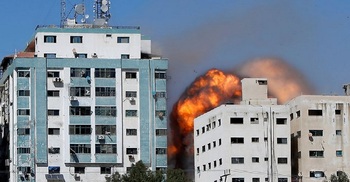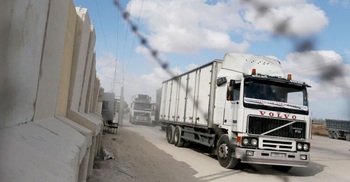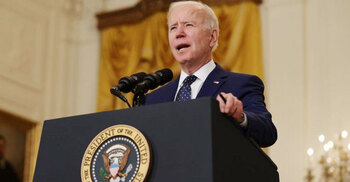CBC journalists told they can’t cover Israel-Palestine after seeking fairer coverage

Two journalists from Canada’s national broadcaster say they’ve been barred from covering the ongoing violence in Israel and the Palestinian territories after signing an open letter calling for more nuanced coverage.
On May 14, an “open letter to Canadian newsrooms on covering Israel-Palestine” began circulating online. The letter, which has now been signed by more than 2,000 people, including many journalists, said Canadian media does not include enough context or Palestinian voices when covering “the ongoing nature of the Israeli occupation.” It ended by asking for “fair and balanced coverage” of the conflict.
Since the letter was published, two employees with the Canadian Broadcasting Corporation told VICE World News they were advised that they could no longer cover the issue because they signed it.
CBC spokesman Chuck Thompson told VICE World News that no employees are being disciplined for signing the letter but the broadcaster is ensuring “editorial distance between signatories (of the letter) and our daily coverage for the near future.”
The letter comes after more than a week of Israeli airstrikes in Gaza, which have killed 228 Palestinians, including dozens of children, according to Reuters. Israel said it was defending itself from Hamas’s rocket attacks, which have killed 12 people. The violence escalated after Israeli police raided the al-Aqsa mosque in Jerusalem, injuring hundreds of Palestinians, following tensions over Israel’s attempts to evict Palestinian families from a neighbourhood in East Jerusalem. On Thursday, Israel and Hamas agreed to a ceasefire.
“According to the United Nations and countless human rights organizations around the world (including ones based within Israel), what’s happening in the Occupied Palestinian Territories is a ‘grave breach of international law.’ Some groups believe the attacks amount to an ‘ethnic cleansing.’ It should be covered as such,” the open letter said.
“Dispossession is not complicated. Violence against innocent civilians and children is not complicated. Police aggression and state sanctioned racism is not complicated. Journalists cover these issues all the time. So why do we tiptoe around coverage of Israel and Palestinians?”
The letter also highlighted the CBC’s decision not to cover a Human Rights Watch report that described Israel’s conduct towards Palestinians as apartheid.
One CBC reporter told VICE World News they signed the letter because they believe the Canadian media’s coverage of the conflict is one-sided.
“With all our resources, how do we not cover (the Human Rights Watch report)?” the reporter said, claiming the CBC has received hundreds of complaints about its coverage of the issue since last week. The CBC did not respond to questions about the nature of those complaints.
The reporter, who does not want to be identified due to potential work repercussions, said they were told that signing the letter goes against the CBC’s journalistic standards and practices, a document that guides the outlet’s coverage using principles like fairness, accuracy, and impartiality. The reporter added that they were told signing the letter gave them the appearance of having a bias and that it violated the broadcaster’s code of conduct because the letter was critical of the CBC.
In an email to staff sent Friday, Brodie Fenlon, editor-in-chief of CBC News, said the letter violates the section of the broadcaster’s journalistic standards and practices that states journalists “won’t take a public position that ‘affects the perception of impartiality and could affect an open and honest exploration of an issue.’”
The reporter said they and other CBC colleagues have faced pushback from managers when pitching stories about the conflict.
“They all got the same answers saying it’s kind of complicated, we don’t know if we have enough information about this,” the reporter said.
Another CBC employee told VICE World News they signed the letter because of a concerted effort within Canadian media to “both sides” the conflict, despite the disproportionate power dynamics favouring Israel.
“Our job as journalists is not to draw false equivalences but to report things as they are,” the employee said. “Preventing the open discussion or reportage of certain assessments or observations by members of the international community is not doing that.”
The employee, who said they have been barred from contributing to coverage of Israel and the Palestinian territories, said the CBC’s perception seems to be “anyone who signs that letter is biased because they’ve now become an advocate.”
Both journalists told VICE World News they don’t believe they were taking a stance, other than pushing for more responsible journalism.
Thompson said the letter creates the appearance of a “conflict of interest” for some of its audience.
“We have been having confidential conversations with the journalists who signed the open letter to better understand their thinking and to help them understand the impact and implications of their actions. The open letter they signed asks for more nuanced journalism and more perspectives in the media’s coverage of the Middle East—an objective we endorse,” he said.
“However, the letter goes further to state that our journalism must be rooted in a specific position on this conflict. That’s not tenable for a news organization ... By adding their names, the CBC journalists who signed the open letter have taken a public stand on this story. That has created the perception of a conflict of interest among some members of our audience.”
Thompson reiterated the CBC is reviewing its journalistic standards and practices through a more inclusive lens.
In a statement, Carmel Smyth, president of the Canadian Media Guild, which represents CBC employees, said the union “will be vigorously defending members’ rights to share an honestly held opinion about balance in the media industry,” and has requested a meeting with senior CBC management.
The issue comes as the media industry has faced increased scrutiny over its treatment of journalists who are Black, Indigenous, and people of colour, including how “journalistic objectivity” is used to paint racialized journalists as being biased.
Op-eds in the Toronto Star and the Ottawa Citizen respectively accused the letter of lobbying for an “anti-Israel bias,” and said the future of journalism is “skewed toward opinion and advocacy, and away from down-the-line reporting.”
Toronto Star columnist and internal ombud Shree Paradkar told VICE World News the newspaper did not sanction any of its journalists who signed the letter. “I had a discussion with senior management the morning after the letter went public. They had concerns about objectivity but understood the nuances around this situation,” she said. “After, they wanted to know how they could support the journalists for safety.”
The Associated Press reportedly fired journalist Emily Wilder after the Stanford College Republicans tweeted about her pro-Palestine activism in university—a thread that got picked up by conservatives with large platforms. Wilder told SFGATE she was told she was fired for violating the AP’s social media policy.
Source: Vice





